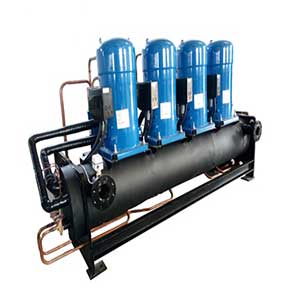Water Chillers Heat Exchangers:
A water chillers heat exchangers are a machine that removes heat from a liquid via a vapour-compression or absorption refrigeration cycle. This liquid can then be circulated through a heat exchanger to cool air or equipment as required. As a necessary by product, refrigeration creates waste heat that must be exhausted to ambient or, for greater efficiency, recovered for heating purposes. Concerns in design and selection of chillers include performance, efficiency, maintenance, and product life cycle environmental impact.
Process:
principles of water chillers heat exchangers are no plant-wide cooling system, a stand-alone refrigerated chillers is often a good solution for a closed-loop cooling system for your induction heating system and will be an economical solution up to cooling power requirements of 90 kW. water chillers heat exchangers are available from Ambrell for cooling requirements from 1kW up to 440kW, with the higher power having outdoor evaporator coils. Water cooled chillers absorb heat from process water and transfer it to a separate water source such as a cooling tower, river, pond, etc. They are generally used for large capacity applications, where the heat generated by an air cooled water chillers creates a problem. They are also considered when a cooling tower is already in place, or where the customer requires optimum efficiency of power consumption. Water cooled chillers require condenser water treatment to eliminate mineral build up. Mineral deposits create poor heat transfer situations that reduce the efficiency of the unit.
Image:

Benefits:
- Nontoxic
- Non-flammable
- Aqueous-based
- Superior heat transfer characteristics
- Attractive alternative to glycols and brines.
Features:
- The closed circuit medium is accessible in its entirety
- The heat exchanger is at low level allowing ease of routine maintenance
- Plates are manufactured in 304 or 316 stainless steel
- Facility to add additional plates for extended cooling surface
- Reduce exchanger mean temperature differences (MTD’s)
- Minimize cooling water consumption
- Debottleneck summertime limited condensers
- Reduce column operating pressure and increase capacity.
Applications:
- Liquid-to-liquid
- Cryogenic
- High pressure
- Clean steam generators
- Blow down
- Natural gas heaters
- Vent condensers
- Mechanical seal coolers
- Compressor inter/after coolers
- Supercritical fluid
- Feed water preheaters
- Lethal service

